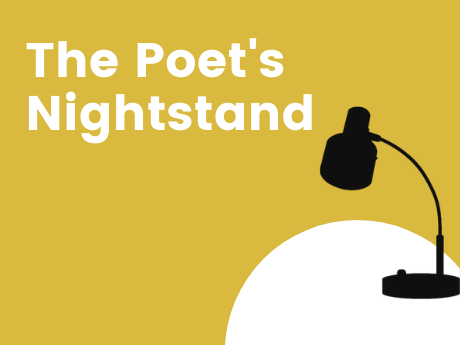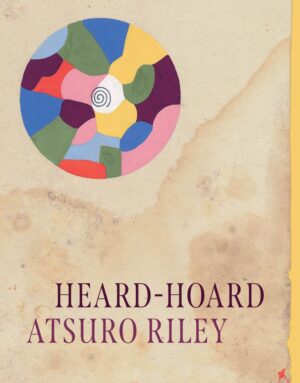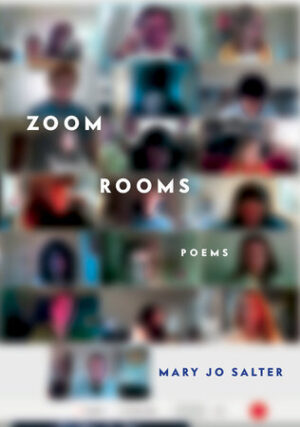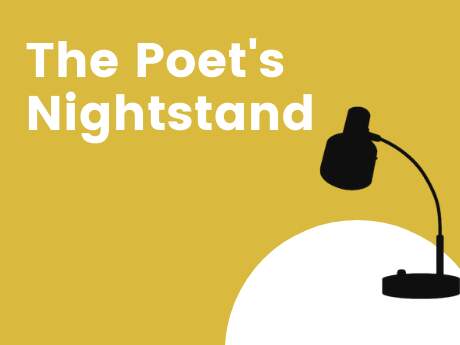The Poet’s Nightstand
The Poet’s Nightstand with Maya C. Popa


Gigantic Cinema: A Weather Anthology
ed. by Paul Keegan and Alice Oswald
Gigantic Cinema (so titled after Virginia Woolf’s description of the sky) was my trusted book recommendation for 2021, and I doubt anyone was disappointed. It is an anthology unlike any I’ve encountered and a deeply original work in its own right. “Weather has no plot,” Keegan and Oswald note in the Preface. “It is all mutability and vicissitude, and so is this anthology.” Their efforts transcend mere curatorship, delivering what one hopes any fine compilation might: connections seen afresh on one’s behalf. Its expansive gathering of voices—Pliny to Proust, Browne to Bishop—make it a rich, surprising, and deeply appealing book.
Purchase Book

Heard-Hoard
by Atsuro Riley
Lush and strange, Riley’s voice is utterly transfixing, bringing South Carolina low country to life in enviable detail (“Her null eye long since gone isinglassy, opal”) and rich music (“Crosses Clary bless her barrow up there now / Pausing and voweling there—/ the place where the girl fell”). He captures the location’s beauty and grit as well as its xenophobic streak, “Word said and word’d spread She’s some flotsam / from that load of ‘those’ what flooded here by boat,” its local tales taking on a folkloric energy. “Moth” tells the story of Candy, who admits: “To her who my mama was // I was pure millstone, cumbrance.” We learn of her plights, and the poem hauntingly ends: “A soul can hide like moth on bark. / My born name keeps but I don’t say.” Phrases borrowed from Bishop, Dickinson, Heaney, Virgil, and Hopkins offer the book a splendid chorus. Riley’s vision is rich with luminous lines, “Long nights back home we boiled our sea / for salt to sell the salt.”
Purchase Book

In a Bucolic Land
by Szilárd Borbély
translated from Hungarian by Ottilie Mulzet
As the daughter of Eastern European refugees, I gravitate to elegies, especially too-long, meandering ones. Borbély’s posthumous final collection is full of them, and I couldn’t help hearing echoes to laments and stories told to me growing up. His impoverished childhood in northeast Hungary takes on a nostalgic and mythic dimension: “The first thread which the gods wound onto / the skeiner came undone at Dawn’s End, where / the poorer gods lived, as there was no place for them / further up in town.” Gloriously aphoristic lines like “All things / speak to us, from the End, about the / helplessness of the Beginning,” which another lyric poet might rightfully draw attention to, are unselfconsciously tucked away in these drawn-out meditations. There’s an excess to his writing, a desperate need to organize and memorialize events. After all, what greater protest is there against the ravages of time.
Purchase Book

Constellation Route
by Matthew Olzmann
“The letter is in the mail. When it reaches you, / everything begins.” Olzmann redeems the postal service in these pages, though that’s not expressly his goal. Various “Letters” allow the poet to fit all manner of considerations into this imaginative motif, exploring loneliness, desire, even America’s fraught multiplicity. “Fate makes an animal of us all, and rides us / through the village at sunrise where we are judged. / But we designed those villages. We built them / from our worst ideas and kept expanding…The human hand / can reach from one ruined thing to the next,” he writes in “To the Horse you Rode on.” I’d be remiss if I didn’t mention that Olzmann is also wonderfully and bleakly funny, eschewing the temptation to focus solely on the deeper nuances of this prolific theme. It’s the mail, after all. Inefficiency is a given, and its roots run deep. Behold, from “The First Official Post Office of the American Colonies (1639)”:
the mail carrier
is any traveler who trundles toward the next town.
As in, “You’re going to Marblehead? Can you take this?”
And if the answer is “Yes,” it will get there
in a few weeks or maybe a couple months.
And by “get there,” I mean it will end up
in another tavern, inn, or brothel.
Wait. You’re sending this letter overseas?
Even worse. Make six copies and place them
on six different ships. Pray.
Purchase Book

Zoom Rooms
by Mary Jo Salter
What I so admire about Salter’s work is that directness never comes at the expense of deep thought, nor does a baseline cheerfulness and willingness to be persuaded by life’s pleasure exist without acknowledgement of senselessness and strife. There is palpable exasperation in these pages—could it be otherwise in a book about Zoom? We feel it in the opening poem, “Your Session Has Timed Out”: “Due to inactivity. / Do you want to reboot / back to your nativity? // Too bad. You can’t go back. / Or forward, for that matter.” “White Petals, 3 A.M.” describes the “wide-eyed whiteness” of blossoms in spring, then remembers those same branches “gloved in snow / that had stored the day’s light somehow,” following the length of that correspondence to “the green / leaves take over the length of summer, / so long you forget you live in time.” Salter captures how our experiences of beauty aren’t quite articulable and implicitly challenge our understanding of time's passing. The affecting final poem asks, “How could such floods of love / not add up to enough?” How indeed.
Purchase Book


